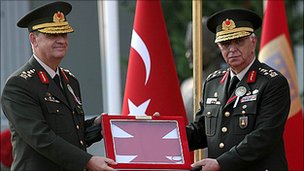UPDATES
Interpreting the Mass Military Resignations in Turkey
August 3, 2011 | Tzvi Fleischer

As readers are probably aware, all of the top leadership of the Turkish military resigned over the weekend – including the Chief of Staff, and the heads of the Army, Navy and Air Force.
What is the signficance of this – in a country where the armed forces have long played a strongly activist role in national politics? This post canvasses some knowledgeable commentary.
The most common interpretation seems to be that the ruling AKP party, which has sought to move the Turkish state in a more Islamist direction, has won an important victory, given that the Turkish armed forces have generally seen themselves as the guardians of the secularist Turkish state set up by Kamel Ataturk in the 1920s.
Turkish journalist Mustafa Akyol sees this as good for Turkish democracy, noting:
The latest round in the tension between Turkey’s elected politicians and overbearing generals ended with four resignations on the latter side, implicitly declaring one thing: Those who have the upper hand in this country are those who win the ballots, not those who point the barrels.
However, others are less sanguine, arguing that the last barrier to the implementation of autocracy by the AKP may have been removed. Noted Israeli historian Benny Morris argues:
The Turkish Islamists, who took control of the country after democratic elections in 2002, are well on their way to completing a revolution which will radically affect the Middle Eastern balance of power and perhaps, more generally, the international arena (West versus Islamic East), practically without protest or opposition… The semi-democracy that was Turkey-during the past decades, intellectuals have repeatedly been subjected to judicial processes, sometimes ending in jail time, for “defaming” the state or the Turkish people, raising the Armenian and Kurdish questions, etc.-may soon give way to something that may resemble Teheran more than Paris or London.
Similarly, the Jerusalem Post editorialises:
…the decades-long balance between modernization and Islam [in Turkey] now threatens to wobble out of control, and the enormity of the implications – for Turkey as for the region – cannot be overstated…With secular opposition parties weakened, Erdogan has also become increasingly autocratic… In this nation – torn between Westernization and traditional Islam – the unraveling of the Kemalist legacy and the resurgence of Islamist populism at the expense of the military will reverberate well beyond Turkey’s borders.
But a different argument comes from Soner Cagaptay, the Turkey specialist at the Washington Institute for Near East Policy. He sees this more as a deliberate challenge to the country’s political rulers by the military, rather than a capitulation to them – a risky “inverted coup”, as he terms it. He describes the move as follows:
Since the Justice and Development Party (AKP), a coalition of conservatives, reformed Islamists and Islamists, came to power in Turkey in 2002, relations between the AKP and the military have been tense. But thus far, the military has played along. By staging a walkout at the leadership level, the Turkish Army has finally told the AKP, “We are done playing with you. Set up your own team — if you can.”
Finally Claire Berlinski, a journalist who lives in Istanbul, says the main debate – “Is this good for Turkish democracy, or bad?” – amounts to a “comparatively unimportant question.” Summarising the arguments of both sides, she notes:
Those who think it’s good find it terrific that at last, the military has learned to express its displeasure with political developments the civilized way: You don’t like it, you resign. Those who think it’s bad note that now Erdoğan can replace them with his boys, further solidifying his hold on every major power center in Turkey. Both observations are correct.
However, she says, the most important question is “Who exactly is running the military now?” She notes that the government has named a former head of the military police as the new interim Chief of Staff and says everything is under control. She then argues:
Let me get this straight: The former commander of the military police has everything under control?
Now, this isn’t easy to control. This is NATO’s second-largest armed force, with more than 600,000 men and women serving in the army, navy, air force and paramilitary gendarmerie. Turkey is smack in the middle of the most volatile region of the world. It’s at the heart of strategic land and sea lines from Gibraltar to the Middle East and Central Asia. This is an environment full of hot conflicts, and Turkey is the last link in the NATO defense chain. And it is, by the way, one of the six NATO countries that have hosted US tactical nuclear weapons, including 90 B61 gravity bombs. You want to hand control of this, right now, to someone wet behind the ears? Are you nuts?
For her full argument, go here.
Tzvi Fleischer
Tags: Turkey





